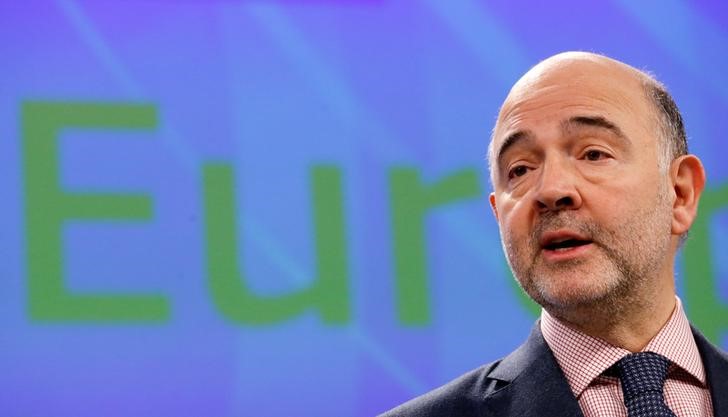By Jan Strupczewski
WASHINGTON (Reuters) - Experts representing international lenders will return to Greece to finalise the details of a reforms-for-loans deal next week, paving the way for an agreement on new loan disbursements in May, European Economics Commissioner Pierre Moscovici said.
Greece and its lenders agreed on April 7 in Malta on key elements of reforms to unlock new funds and decided that experts would travel to Athens as soon as possible to put finishing touches to the deal.
The delay of two weeks was mainly for technical reasons, Moscovici said, adding some finishing touches to the Malta agreement would be put at talks in Washington, on the sidelines of the annual meetings of the International Monetary Fund.
"It is a matter of technical arrangements, we are preparing the conditions, it was always foreseen that it would happen after the IMF meetings, the day after the IMF meetings they will be able to go back to Athens, because they have the political mandate which is very clear," Moscovici told Reuters.
"I am confident that the last technical details will be solved during those meetings here so that the mission can go back to Athens just after these meetings," he said.
Greece is on its third bailout from euro zone governments since 2010. To get more cheap loans, it has to pass regular reviews of reforms by experts sent by the lenders.
The latest review has dragged on since the middle of last year because of differences over pension and income tax reforms that some lenders believe Greece must undertake to put its finances on a sustainable footing.
Greece and the euro zone agreed in Malta that Greece would take steps to produce savings in its pensions system of one percent of GDP annually starting in 2019, an election year.
Another one percent annually is to come from reform of the income tax system in 2020.
The additional reforms are mainly to satisfy the International Monetary Fund and Germany, which have been sceptical that Greece would be able to reach previously agreed fiscal targets without them.
To make the deal more palatable for Athens, the lenders agreed that if Greece exceeds its targets with the additional measures, it can spend the excess cash on boosting the economy.
The Greek target is a budget surplus before debt servicing of 3.5 percent of GDP in 2018. It is then to be maintained at that level over the "medium term". There is no agreement yet on what exactly "medium term" means.
The longer Greece keeps such a high surplus, the less it is likely to need debt relief. The IMF strongly insists that easing Greece's debt burden is necessary, while Germany - Greece's biggest creditor - strongly opposes it.
Germany wants the IMF to join the bailout, now shouldered by euro zone governments alone, mainly for credibility reasons.

The Fund says that if it were to participate, it would have to be the last rescue package for Greece and that means substantial debt relief offered now.